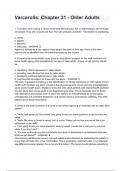1. A student nurse visiting a senior center tells the instructor, "It's so depressing to see all these
old people. They are so weak and frail. They are probably all senile." The student is expressing:
a. reality.
b. ageism.
c. empathy.
d. advocacy. - ANSANS: B
Ageism is defined as a bias against older people because of their age. None of the other
options can be identified from the ideas expressed by the student.
2. A community mental health nurse plans an educational program for the staff members of a
home health agency that specializes in the care of older adults. A topic of high priority should
be:
a. identifying clinical depression in older adults.
b. providing cost-effective foot care for older adults.
c. identifying nutritional deficiencies in older adults.
d. psychosocial stimulation for those who live alone. - ANSANS: A
The topic of greatest immediacy is the identification of clinical depression in older adults. Home
health staff members are better versed in the physical aspects of care and less knowledgeable
about mental health topics. Statistics show that older adult patients with mental health problems
are less likely than young adults to be diagnosed accurately. This is especially true for those
with depression and anxiety, both of which are likely to be misinterpreted as normal aging.
Undiagnosed and untreated depression and anxiety result in unnecessary suffering. The other
options are of lesser importance.
3. Which is the best comment for a nurse to use when beginning an interview with an older adult
patient?
a. "Hello, [call patient by first name]. I am going to ask you some questions to get to know you
better."
b. "Hello. My name is [nurse's name]. I am a nurse. Please tell me how you would like to be
addressed by the staff."
c. "I am going to ask you some questions about yourself. I would like to call you by your first
name if you don't mind."
d. "You look as though you are comfortable and ready to participate in an admission interview.
Shall we get started?" - ANSANS: B
This opening identifies the nurse's role and politely seeks direction for addressing the patient in
a way that will make him or her comfortable. This is particularly important when a considerable
age difference exists between the nurse and the patient. The nurse should address patients by
, name, but should not assume a patient wants to be called by his or her first name. The nurse
should always introduce him- or herself.
4. A 75-year-old patient comes to the clinic reporting frequent headaches. After an introduction
at the beginning of the interview, the nurse should:
a. initiate a neurologic assessment.
b. ask if the patient can hear clearly as the nurse speaks.
c. suggest that the patient lie down in a darkened room for a few minutes.
d. administer medication to relieve the patient's pain before performing the assessment. -
ANSANS: B
Before proceeding, the nurse should assess the patient's ability to hear questions. Impaired
hearing could lead to inaccurate answers. The nurse should not administer medication (an
intervention) until after the assessment is complete.
5. Which statement about aging provides the best rationale for focused assessment of older
adult patients?
a. Older adults are often socially isolated and lonely.
b. As people age, they become more rigid in their thinking.
c. The majority of older adults sleep more than 12 hours per day.
d. The senses of vision, hearing, touch, taste, and smell decline with age. - ANSANS: D
Only the correct answer is true and cues the nurse to assess carefully the sensory functions of
the older adult patient. The incorrect options are myths about aging.
6. A nurse asks the following questions while assessing an older adult. The nurse will add the
Geriatric Depression Scale as part of the assessment if the patient answers "yes" to which
question?
a. "Would you say your mood is often low?"
b. "Are you having any trouble with your memory?"
c. "Have you noticed an increase in your alcohol use?"
d. "Do you often experience moderate-to-severe pain?" - ANSANS: A
Feeling low may be a symptom of depression. Low moods occurring with regularity should
signal the need to assess further for other symptoms of depression. The other options do not
focus on mood.
7. A 78-year-old nursing home resident with hypertension and cardiac disease is usually alert
and oriented. This morning, however, the resident says, "My family visited during the night. They
stood by the bed and talked to me." In reality, the patient's family lives 200 miles away. The
nurse should first suspect that the resident:
a. may have a cognitive impairment associated with medication effects.
b. may be developing Alzheimer's disease associated with advanced age.


